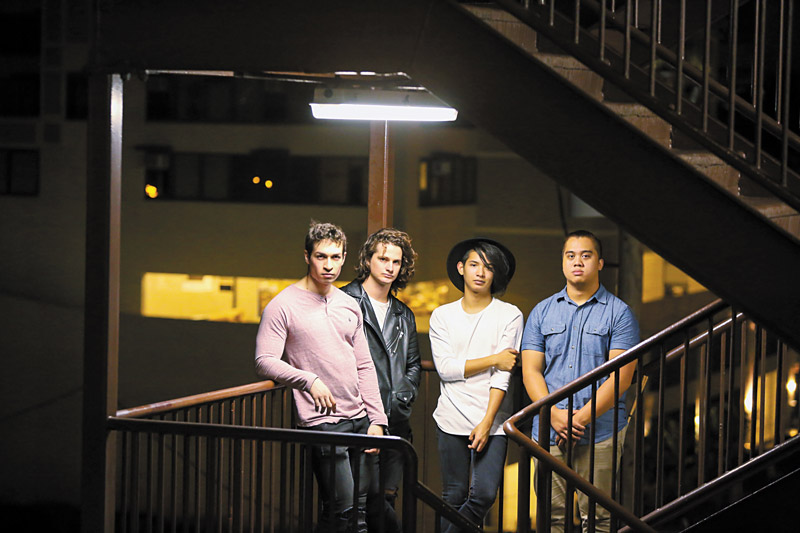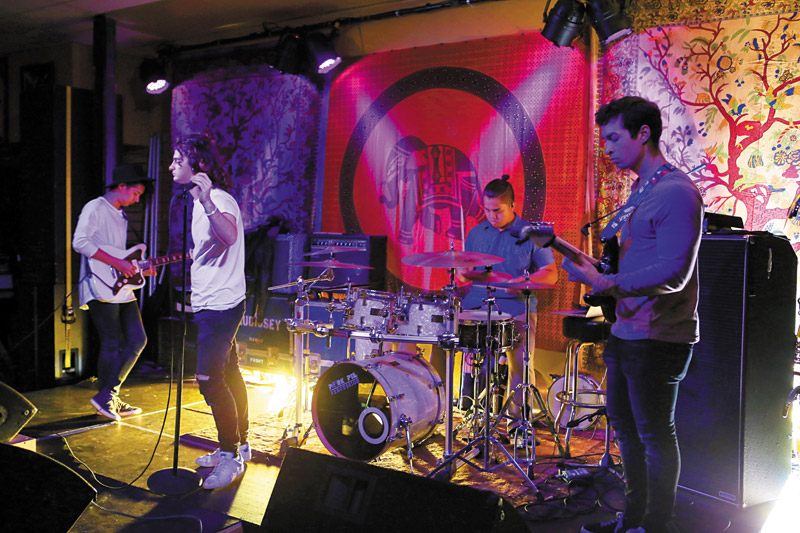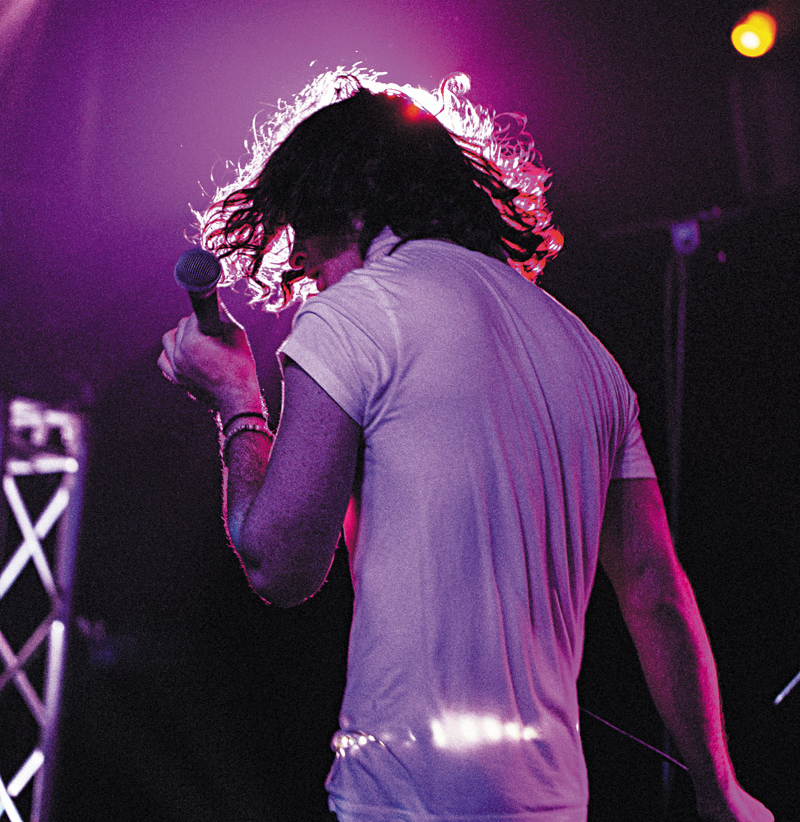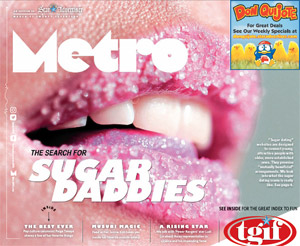Ivory City’s Dream Gig

Ivory City is (from left) guitarist Skyler Sponberg, singer Josh Sharp, guitarist Jon Banquil and drummer Elias English BODIE COLLINS PHOTO
When dream pop band Ivory City is asked how they managed to land what is probably the biggest gig a local band could have this year — opening for The Cure at the Blaisdell July 16 and 17 — all four members have the same immediate reaction: They laugh.
“We don’t know,” says lead singer Josh Sharp.
“We don’t know, honestly,” adds guitarist Jon Banquil.
The shrug-off response is hardly a tepid attitude toward the gig — they call The Cure “iconic,” count the band among their musical heroes and exude an overall nervous excitement about the whole thing. Rather, the response is more of a recognition of just how remarkable it really is that, in about three weeks, they are going to be sharing a stage with The Cure.
It’s a huge break — especially considering that Ivory City is relatively new. (And they’re all young, ranging in age from 19 to 24.) While Banquil had had various iterations of what eventually became Ivory City in the works for some time, the current lineup is only about two months old.
Sharp joined Banquil and his former band mates in October, while drummer Elias English and guitarist Skyler Sponberg came in merely several weeks ago. And now here they are, opening for The Cure.
“We are very aware of how special an opportunity we have been given — this is once in a lifetime,” Sharp says. “And we know that when we hit the stage those nights, a lot of people are going to be looking at us, and we are going to be exposed to a lot more people than we ever have been exposed to before.”
While there has been a certain fortuitousness at play, it’s more than just a lucky break. They’re all talented musicians in their own rights, but something else happens when they play together, some almost-preternatural degree of fluidity. The four of them just click — and now that they’ve found each other, they’re all unequivocally dedicated to the success of their new band.
“WE JUST JELLED”
The scene right before a Monday night Ivory City practice in The Studio at Hawaiian Brian’s is a little chaotic. The band mates are all over the place — finishing dinner, chugging energy drinks (then subsequently pacing the span of the room), running to their cars for more gear, troubleshooting an issue with the soundboard.
But then they get on stage. They get on stage and all of a sudden, they are all entirely focused, and entirely cohesive.
By all of their accounts, that easy collaboration was immediately evident from the first time they played together.
“We just jelled,” English says, remembering their first gig together at Urban Outfitters. “It kind of felt like we had been doing it for years.” (English, it’s worth noting, had initially only agreed to be their drummer through The Cure show. But the first time he practiced with the band — right after the first song, even — Sharp turned to him and said, “Hey, can you be our drummer forever?”)
It’s a dynamic that seems to extend off-stage, too. They’ve already got nicknames for each other (each corresponding to their animal likeness: Banquil is Fox, English is Bear, Sharp is Reindeer, Sponberg is Tiger), inside jokes, and their conversations are peppered with the kind of good-natured teasing that usually only comes with lengthier friendships. (When Banquil hangs his head down in shame while recalling an early-on band name pitch he’d had, Sharp retorts with: “There have been worse. Not many, but you know…”)
But while their dynamic might be an easy one, reaching this point was a hard-earned path.
Before connecting with any of the current members, Banquil had been working on Ivory City for more than a year, but he was having a tough time refining the project. When he brought Sharp on last fall — the two had had the music equivalent of a meet-cute when Sharp heard some impressive guitar playing at Easy Music Center, and when he followed the sound through the store, there was Banquil — things began to look up.
And indeed, things started progressing — quickly.
After playing their first gig with Sharp at Hawaiian Brian’s last October, venue co-owner Lee Anderson approached them: He wanted to be their manager. Anderson’s day job keeps him plenty busy, and he has no aspirations to become a full-time music manager, but every once in a while, he will manage an act that he really believes in. Right away, he knew he found that in Ivory City.
“I think it is just their energy and the way they approached the show,” Anderson recalls. “It’s really high-energy and they have a dramatic performance … I just wanted to see them continue making music.”
Anderson got them gigs at various venues around town and sent a demo to The Republik; soon after, they were opening for AWOLNATION. Banquil and Sharp recall it was a great show — it sold out and they felt they really connected with the crowd. “No one gives a crap about opening bands — the fact that (the crowd) kind of gave a crap about us was like ‘yes!'” Banquil says.
With that show having gone over so well — they speculate it was sort of an informal audition — they were offered The Cure slot soon after.
But around that time, Banquil and Sharp began having issues with their former band mates — the gist of which was simply that Banquil and Sharp were all in when it came to Ivory City, and they needed other musicians that were right there with them.
“We love them and they were great players,” Sharp says of the former members.
“And great people in general,” Banquil adds.
“But it just got to the point where they couldn’t commit to practice and they couldn’t commit to the band or being ready for the show,” Sharp says.
Following tears and hugs, the other members left, and Banquil and Sharp began searching for ones who could commit, at least for The Cure show. They just needed that; they could always figure out the future later. But when they played with English and Sponberg, they all realized that was their future.
“LIFE PARTNERS”
If you’re reading this and thinking that the way the members of Ivory City came together as a band sounds vaguely romantic, you’re not imagining it; they all make frequent jokes about the band’s origins in relationship-esque terms. (Like Banquil and Sharp recounting their first meeting, for instance: “It was love at first sight,” Sharp says. “He was like, ‘Hey could I, uh, have your number?’ And I was like, ‘Oh, you are kind of cute, buy me dinner first,'” Banquil quips. Or Sharp describing how he had known Sponberg peripherally for years: “I always kind of had a crush on him — I was like, ‘I want to be in a band with him.'”)
But perhaps their most telling relationship metaphor is when Sponberg calls them all “life partners.”
Ivory City, for all four of them, is their musical endgame.
Sure, they all have other endeavors in their lives — Banquil teaches music and goes to school, English also teaches music and has a full-time job at a warehouse, Sharp has regular solo gigs and works as a delivery driver, and Sponberg works at Easy Music Center and is a full-time biology student — but Ivory City is not just a priority; it’s the priority.
“I generally describe us all as pretty busy people,” Sponberg says, “it is just the fact that everybody here is willing to … prioritize this over everything else. It is a really important attitude to have.”
“It is going to get to a point where someone on the Mainland is going to be like, ‘I want Ivory City right here, right now,'” Banquil says matter-offactly. “And we all just have to drop everything and go.”
The others nod in agreement — they’re confident that that point will come, “as long as we keep working,” Sharp says.
“A DREAM POP BAND IN A PUNK BAND DREAM”
It’s perhaps because of Ivory City’s still-newness, or perhaps it just speaks to how talented each of them is individually, but these guys seem genuinely in awe of each other as musicians.
Like this exchange, for example, when talking about English’s drumming style: “You remind me of Steve Jordan meets Carter Beauford, meets …” Sharp says.
“Jesus,” Banquil finishes.
Or this: “You will hear the song itself is just like a really tight groove poppy sound, and out of the blue, Skyler will come with this face-melting fire-on-the-guitar solo, and you will hear (English) just going thunderous on the drums,” Banquil says.
While they come from disparate musical backgrounds — Sponberg’s first instrument was the violin, and both he and English did stints in reggae bands, for instance — they do have a set of shared influences that they bring to Ivory City; Michael Jackson and The 1975 are chief among them.
They describe Ivory City’s sound as “a dream pop band in a punk band dream” or “indie sex pop.” A performance video on Urban Outfitters’ YouTube channel comes with this description: “if Michael Jackson’s music had a love child with The 1975 and that child married the offspring of Explosions In The Sky and M83’s baby after which those two offsprings got married and then divorced a year later due to musical differences seeking new lovers in the form of ‘80s dance culture.”
At the core of what they’re going for, though, Banquil — who composes the instrumentals before passing it along to Sharp to write the lyrics — explains that they follow this philosophy: “When you listen to our music, we want you to enter whatever situation and feeling that song projects.”
Listeners, then, are in for an intense, raw emotional up-and-down. As English aptly describes: “You have Sushi that makes you happy and bubbly, and then you have Pills that makes you want to stand in the corner and cry for the rest of your life.”
“IT CAN ONLY GET BETTER”
While the band may still be mystified as to how they got to be the opener for The Cure, BAMP Project co-founder Matty Hazelgrove, who pegged them for the gig, says this: “There are a lot of great local bands out there right now, but to me, Ivory City is one that really stands out. While they have a very current sound, to me I hear a slight nod to some of the great acts from the ‘80s and because of that, I knew they would be a perfect band to get this opening spot. I think they are worth arriving early to see live. I think that once people see them perform at this show, they will win over new fans.”
Currently, Ivory City is busy prepping for the show. In the weeks leading up to it, they also plan to release a single, Affection, and an EP.
So what is next, after The Cure? Where does a young band go after such early success?
“We retire,” Sharp deadpans.
“That is where the sidewalk ends,” Banquil jokes.
The truth? “We have a gig the next day,” English says.
In the coming months, they plan to get started on recording a full-length album. Ideally, they say, they want to have a hybrid recording studio/house where they can all live, in order to dedicate even more of their time to Ivory City.
“I don’t know what is going to happen in the future,” Banquil says. “But I know that if we keep working at it, something is bound to happen. With something like the amount of musicianship we have, it can only get better.”
He doesn’t even pause before repeating, “It can only get better.”
For more information, visit ivorycitymusic.com or find Ivory City on Facebook, Instagram and SoundCloud.




